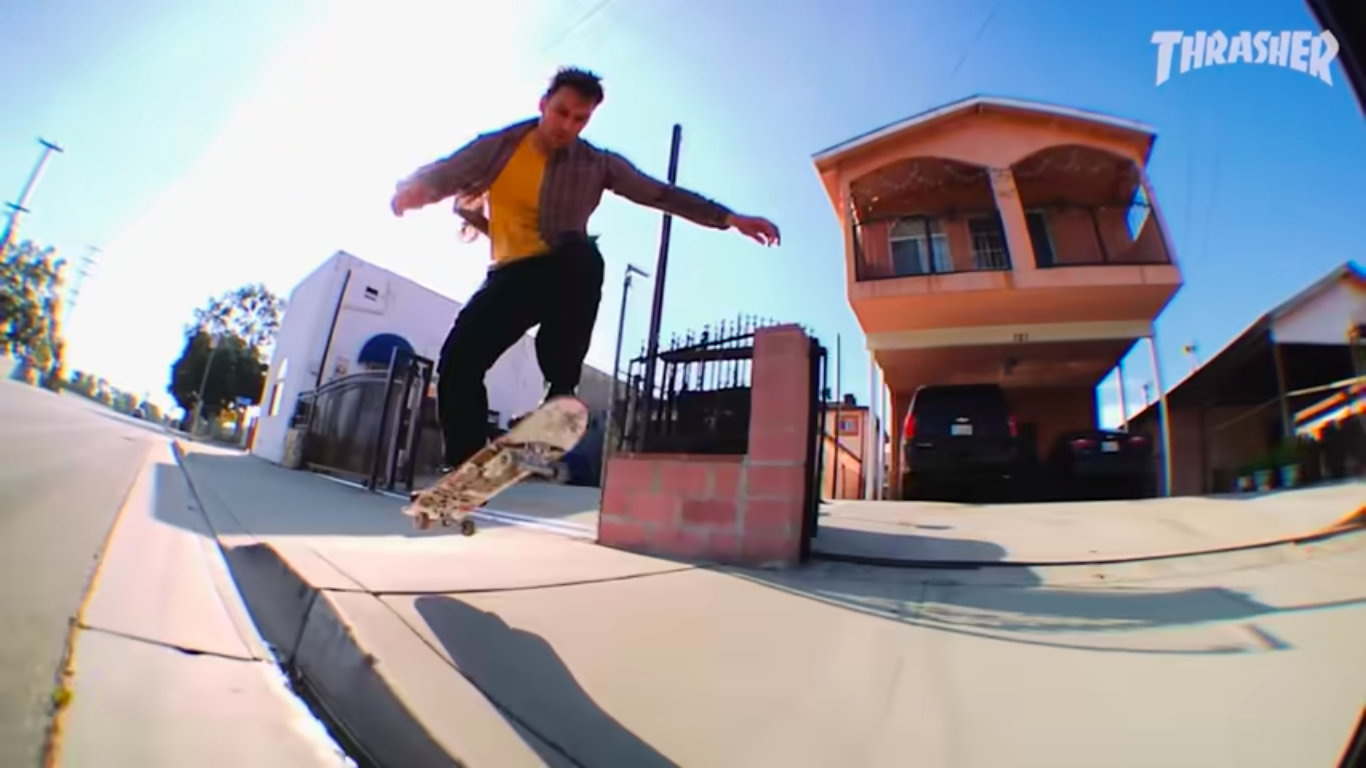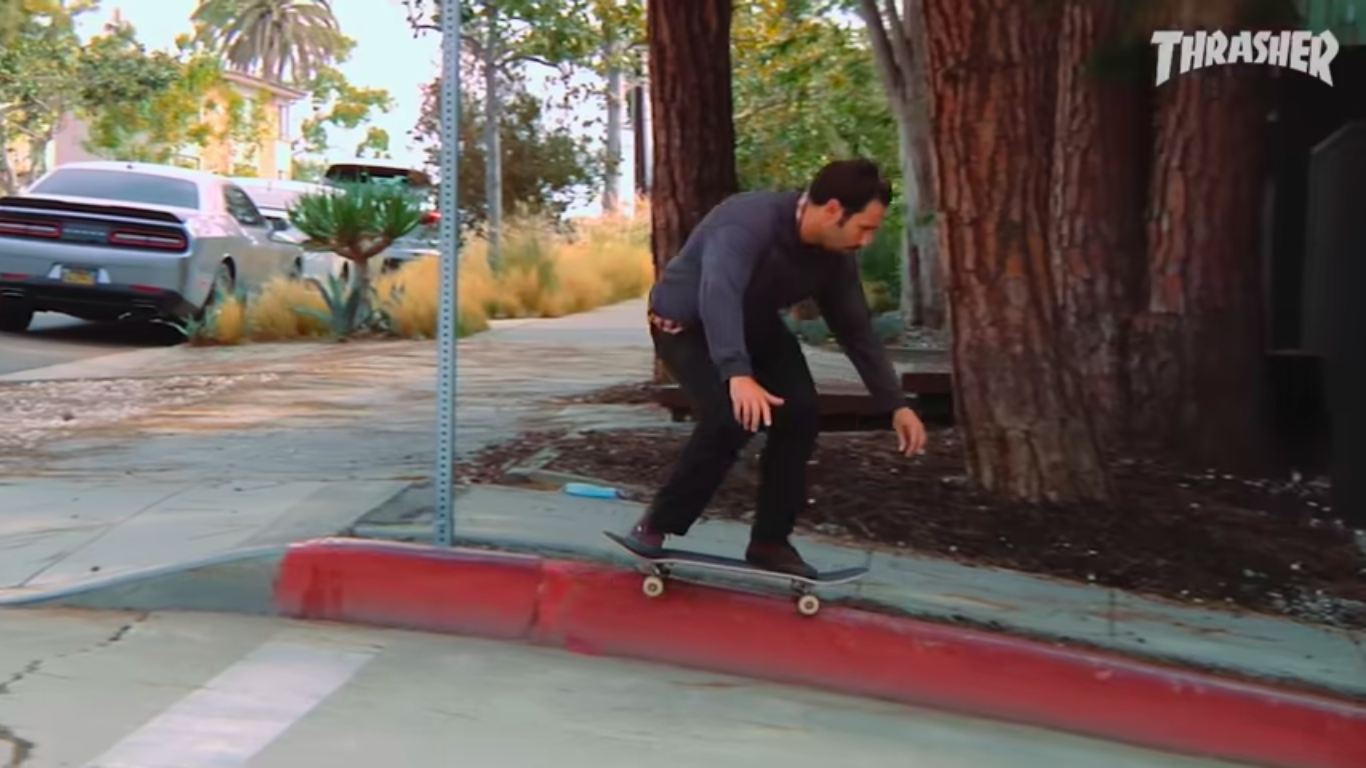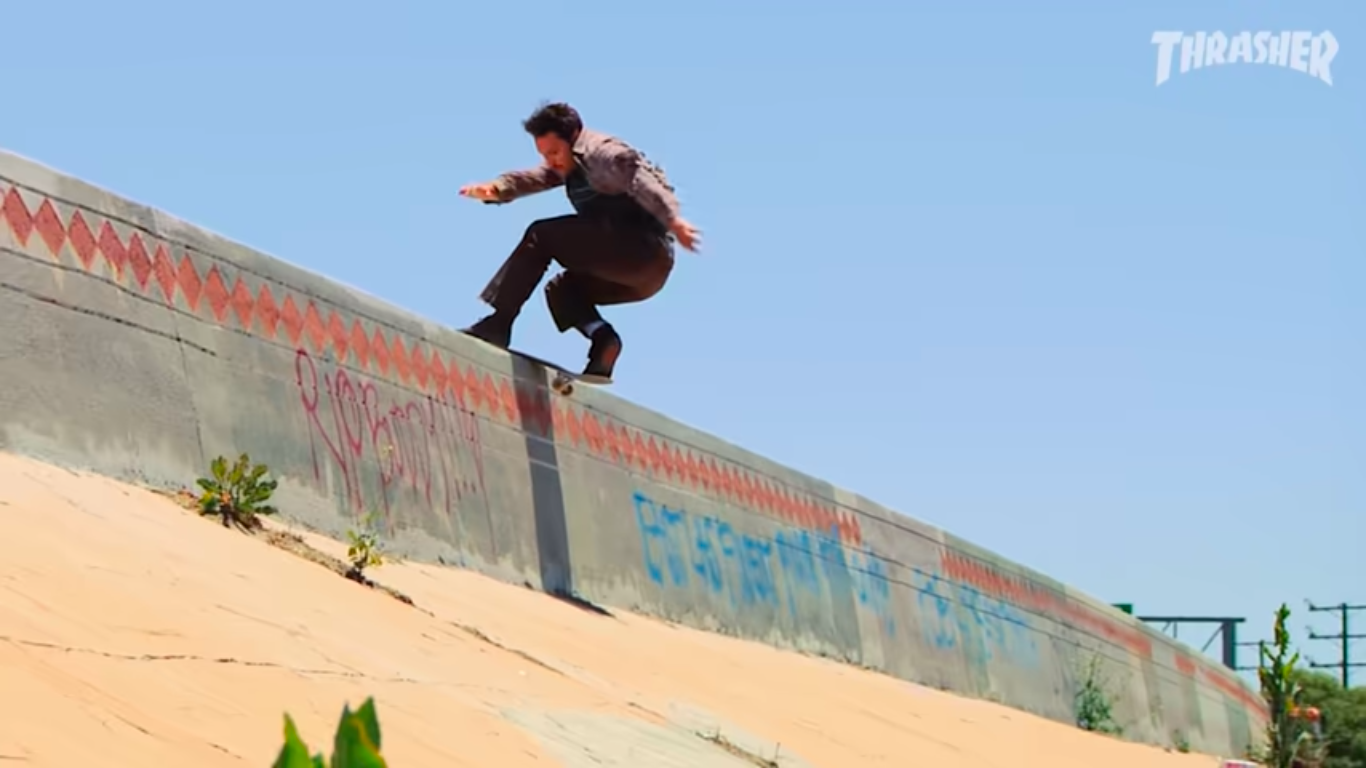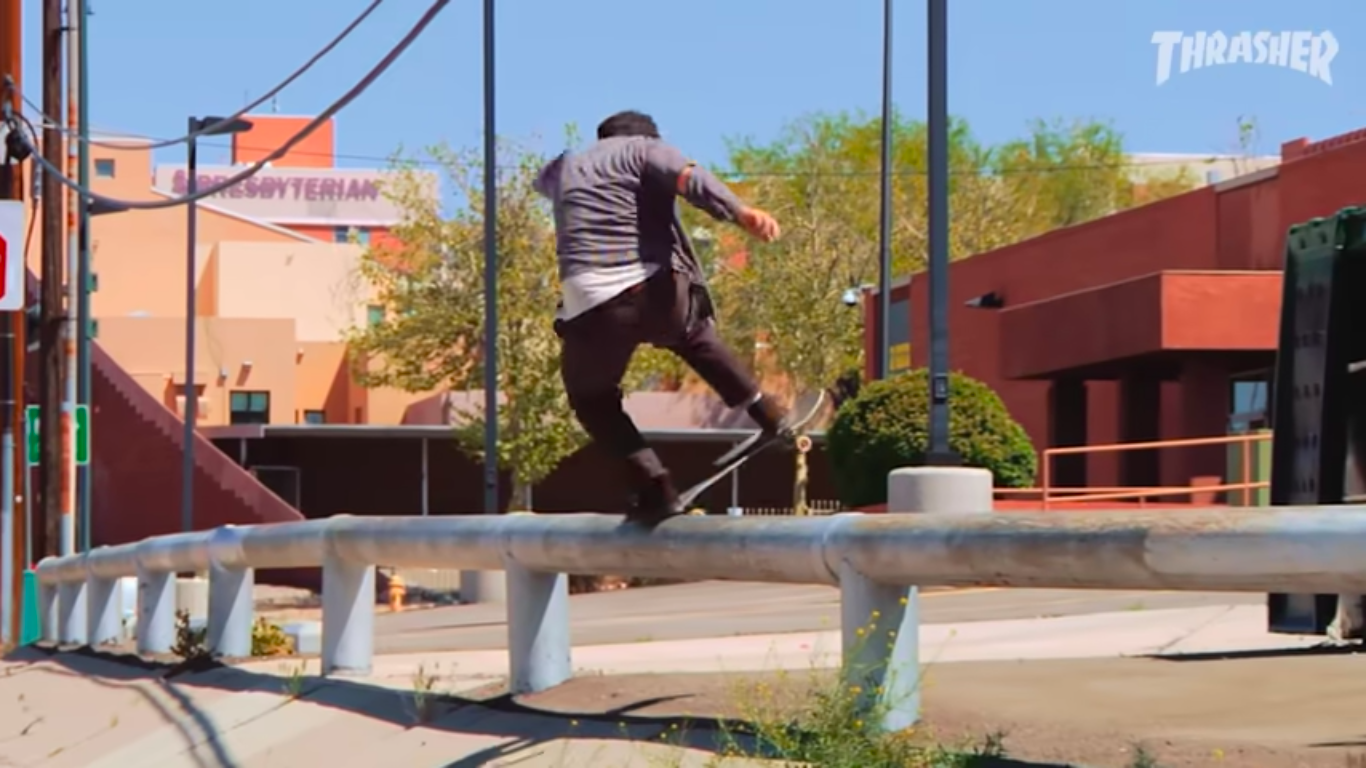The Hack: On AA for Vans
Several years ago, Andrew Allen was cast as FBI agent Johnny Utah in a theatrical-adaptation of Point Break. On the surface, the 1991 film about a rookie, overachieving cop (Keanu Reaves) who infiltrates a group of bank robbing surfers (led by Patrick Swayze) seems like an unusual subject for the stage, but its outlandish plot has earned the film a cult following over the years. Audiences see it as something of a parody, and appreciate its mashup of the heist film and teensploitation genres for ironic value. Its allure also stems from the hyperbolic portrayal of hypermasculinity and violence, and the incongruity between Swayze’s violent sociopathy and the childish object of his quest (no work, big waves)—“It’s not tragic to die doing what you love”, he says. And between the histrionic acting, and the adrenaline-junky subject matter, emotional depth is subordinated to maximum intensity, the film’s camp appeal best summed up in Reaves’ sappy look of blank incomprehension.
After viewing Allen’s latest Vans part, one wonders how much of his style derives from Point Break, and other cult action movies from the 1980s and early 90s—and, perhaps, from the period in the lives of these characers that comes after. There’s a distinct pathos found in his approach to the board that isn’t found anywhere else in the skate world. He’s good, he’s talented, he has done some truly gnarly tricks over the years. But his style is sappy, sort of lugubrious, doleful—as one commenter on the part’s YouTube page puts it, it always looks like he’s going to fall down. He’s ridden for Anti-Hero. He currently rides for Hockey. He is by now a lifer at Vans. Three incredibly well-respected companies. But none of these sponsors quite capture his cult appeal or winking demeanor. More to the point, Allen is championed by the mainstream, and has a cultish following amongst the style snobs of this world (me included), a balancing act made all the more unusual by his deliberate de-skilling over the years, as if the more refined his skating gets, the clumsier he looks on a skateboard.
After viewing Allen’s latest Vans part, one wonders how much of his style derives from Point Break, and other cult action movies from the 1980s and early 90s—and, perhaps, from the period in the lives of these characers that comes after. There’s a distinct pathos found in his approach to the board that isn’t found anywhere else in the skate world. He’s good, he’s talented, he has done some truly gnarly tricks over the years. But his style is sappy, sort of lugubrious, doleful—as one commenter on the part’s YouTube page puts it, it always looks like he’s going to fall down. He’s ridden for Anti-Hero. He currently rides for Hockey. He is by now a lifer at Vans. Three incredibly well-respected companies. But none of these sponsors quite capture his cult appeal or winking demeanor. More to the point, Allen is championed by the mainstream, and has a cultish following amongst the style snobs of this world (me included), a balancing act made all the more unusual by his deliberate de-skilling over the years, as if the more refined his skating gets, the clumsier he looks on a skateboard.
Like the best cult films, there is a somewhat subversive sense of camp going on, an appreciation of the perverse that signals an underlying sense of sophistication. Yout get it in the way that he muscles a series of ollies down some sun-baked suburban driveways, before stiff-legging a backside flip at the very end, the scrappy, somewhat hackneyed tricks out of proportion with the epic length of the sequence. You get it in the way that he transposes mini-ramp tricks onto street spots, grappling with low-impact maneuvers like a mere slash on brick bank, or a frontside rock and roll on a highway barrier, as if they took place on a backyard 6-footer. And, perhaps most notably, you get it in Allen’s approach to slams, the severity of which are always incommensurate with the degree of danger he’s skating at. Here, a slam tellingly introduces the part with an image that recalls his role as Johnny Utah: Allen plotzed down on his tush like a toddler, blinking blankly in the sun, as if he has no idea how he got there.
To put it simply, Allen is a hack. Or, at least he plays one on (YouTube) TV. It’s a schtick he has cultivated for years, and it is tremendously affecting, playing on the inherent self-consciousness of most skateboarders—perhaps, feeling that they aren’t any good, or that they’re getting too old for this, or that the trick wasn’t that cool anyway, or what do their friends think, or what do their partners think, or what does anyone think (I immediately think of the awkwardness of going to the skate park, and having all the older guys blow by me, hardly feeling like I size up to the competition. It’s something I still feel today, though now it derives from younger skaters, which is why I only go to LES before 10am for adult swim). It’s a role that relates to a skater’s inherent sense of self-doubt and insecurity: whether we are the most confident on a skateboard, or simply dick around, the very nature of playing with this four-wheeled toy means that everyone feels at one time or another like a hack (skating is also just really hard). In deliberately adopting this character-type, however, and exaggerating it to profound effect, Allen gets to the roots of these insecurities, and delivers images that tease out our sympathies, making his struggles relatable to ours, often by dedicating himself to low impact obstacles, and wrestling a measly triumph out of them. You get it when he rides onto one long, downhill red curb—and I mean rides on, just using the angled edge of a sidewalk ramp to cautiously ease himself onto the slope. The spot has beginner written all over it, even “little kid spot”, but here’s Allen, looking like an out-of-work teamster with his decidedly louche, and adult-entertainment-esque goatee. (The look also bares resemblance to Bruce Springsteen as he wanders the eponymous city in “The Streets of Philadelphia”, his 1993 music video).
To put it simply, Allen is a hack. Or, at least he plays one on (YouTube) TV. It’s a schtick he has cultivated for years, and it is tremendously affecting, playing on the inherent self-consciousness of most skateboarders—perhaps, feeling that they aren’t any good, or that they’re getting too old for this, or that the trick wasn’t that cool anyway, or what do their friends think, or what do their partners think, or what does anyone think (I immediately think of the awkwardness of going to the skate park, and having all the older guys blow by me, hardly feeling like I size up to the competition. It’s something I still feel today, though now it derives from younger skaters, which is why I only go to LES before 10am for adult swim). It’s a role that relates to a skater’s inherent sense of self-doubt and insecurity: whether we are the most confident on a skateboard, or simply dick around, the very nature of playing with this four-wheeled toy means that everyone feels at one time or another like a hack (skating is also just really hard). In deliberately adopting this character-type, however, and exaggerating it to profound effect, Allen gets to the roots of these insecurities, and delivers images that tease out our sympathies, making his struggles relatable to ours, often by dedicating himself to low impact obstacles, and wrestling a measly triumph out of them. You get it when he rides onto one long, downhill red curb—and I mean rides on, just using the angled edge of a sidewalk ramp to cautiously ease himself onto the slope. The spot has beginner written all over it, even “little kid spot”, but here’s Allen, looking like an out-of-work teamster with his decidedly louche, and adult-entertainment-esque goatee. (The look also bares resemblance to Bruce Springsteen as he wanders the eponymous city in “The Streets of Philadelphia”, his 1993 music video).
Another reason that this role is so affecting is Allen’s ability to repeat it with more or less the same result, speaking to its democratic allure, and general universality of its themes. It’s the type of shtick that someone who has been in the business a long time knows how to deliver (something he may have learned less from Keanu, and more from Gary Busey in Point Break). The result is that Allen really needs to work the bit, as when he puts on his best flannel to skate the remaining banks at L.A. High, which seems like a willing concession to his fans—a “that’s showbiz” and “give the people what they want” type of thinking that touches on both the sense of being trapped in a one-dimensional character, and the if-it-aint-broke-dont-fix-it mentality of someone who is determined to make a living with his skateboard. Here, however, Allen nonetheless treds new ground by skating the white bank with a series of fakie-based tricks, drawing on his well-established repertoire, but finding new range in a fakie-tailslide, out of which he kickflips back into the bank. It’s not the craziest thing he could have done, and it’s not the best thing in his part, but the unusual variation’s knee-rattling angularity, and the way it jerks his entire body to contend with the steep role-away still gives us something new enough, and visceral enough to know that his heart is still in it.
The downside to playing the yutz, the fall guy, the clown, or the dope, and pursuing character skating in general, is that it will never be epic. Skaters like Louie Barletta, Frank Gerwer, Peter Smolik, and, dare I say, Jason Dill have had enduring careers, and have made no small impact on skateboarding, and more contemporary skaters like Gustav Tonneson, Nik Stain, and Kevin Rodrigues have their own niche followings, but they will never be SOTY, they will never be on the pedestal at X Games or the Olympics, they will never be the centerpiece of a documentary on their life, and they will never get their name on a Nike shoe (though Allen has his name on a Vans one…). They will probably never even have a multi-part appearance in a full-length video. Think of how many background mobsters you recognize, but don’t know the names of. How many actors you have a vague, longstanding familiarity with on Law and Order: SVU (1999-present)—like, wasn’t that one lawyer a cop on The Wire (2002-08)? But then again, when the right part comes around, as it did for Mickey Rourke in The Wrestler (2008), Andrew Dice Clay in A Star is Born (2018), and Jean-Claude Van Damme in JCVD (2008), all characters in the second act (or third) of their lives, played by actors in the second (or third) act of their careers, you get something quite magical, heartfelt, and filled with a profound humor at the small and petty ways life will always get the best of you—something even Oscar worthy, in some cases, but mostly a sense that no one else could have played this role quite so well. (I mean, Allen takes slams, it’s a trope of his career, but I’m surprised there is not more footage of him hitting a pebble).
The downside to playing the yutz, the fall guy, the clown, or the dope, and pursuing character skating in general, is that it will never be epic. Skaters like Louie Barletta, Frank Gerwer, Peter Smolik, and, dare I say, Jason Dill have had enduring careers, and have made no small impact on skateboarding, and more contemporary skaters like Gustav Tonneson, Nik Stain, and Kevin Rodrigues have their own niche followings, but they will never be SOTY, they will never be on the pedestal at X Games or the Olympics, they will never be the centerpiece of a documentary on their life, and they will never get their name on a Nike shoe (though Allen has his name on a Vans one…). They will probably never even have a multi-part appearance in a full-length video. Think of how many background mobsters you recognize, but don’t know the names of. How many actors you have a vague, longstanding familiarity with on Law and Order: SVU (1999-present)—like, wasn’t that one lawyer a cop on The Wire (2002-08)? But then again, when the right part comes around, as it did for Mickey Rourke in The Wrestler (2008), Andrew Dice Clay in A Star is Born (2018), and Jean-Claude Van Damme in JCVD (2008), all characters in the second act (or third) of their lives, played by actors in the second (or third) act of their careers, you get something quite magical, heartfelt, and filled with a profound humor at the small and petty ways life will always get the best of you—something even Oscar worthy, in some cases, but mostly a sense that no one else could have played this role quite so well. (I mean, Allen takes slams, it’s a trope of his career, but I’m surprised there is not more footage of him hitting a pebble).
I’m not saying that Allen’s most recent part for Vans is one of those instances of greatness, but I will say, the way he continues to work the bit is inspired. The song choice is good, the fits are great—a little on-the-nose, but The Pixies with flannels, what more could you want? And Allen’s association between skaters and these types of luckless outsiders also represents a touch of genius, speaking in the cult-cinema, b-movie, one-dollar-VHS-you-found-at-the-thrift-store language that would appeal to some lost children attempting to make meaning from the overlooked, and discarded parts of the city (skaters). You just can’t help but root for the guy, even if he clearly never seems to learn his lesson. Because, it isn’t just that Allen is playing this role, he is this role, delivering a performance that speaks to all those nagging judgments we level at ourselves, or that life seems to shoulder us with—a need for sympathy, a need for love, and the fear that to express those needs would be humiliating. Perhaps even that skating, our coping mechanism for these feelings, is precisely what makes us unlovable, that skating played us, and makes us look like a fool. You get it in the way he pops over rails, another trope of his from the last few years. In committing the entirety of his stout body to the trick, he comes across as too trusting—the spot, often a curb or parking block, seldom seems worthy of the risk. But here, as elsewhere in Allen’s skating, the brilliance isn’t about its epicness. It’s that the clip gives rise to our sympathies whether it lands him on his ass or not.•••
Special thanks to JK for editorial support.
Special thanks to JK for editorial support.



